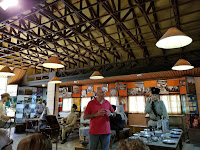I'm often asked about Thanksgiving in Israel. Do people know what it is? Is it celebrated? Can you get turkey? Cranberry sauce? Pumpkin pie?
One thing is for sure. Israelis might not know about Thanksgiving, but they know about Black Friday. It's caught on here, without the insanity of stores being open for 24 hours starting at midnight or whatever the shopping hours are. When I explain to Israelis what Black Friday in the U.S. is like they are incredulous. Who waits in line for hours just to get a TV at a bargain price? Who shops at 3AM? Who fights over the last microwave? Because Shabbat starts at 4PM, Black Friday extends at least until Sunday and possible longer.
Thanksgiving, being the consummate American holiday, is celebrated by most Americans here. Traditionalists celebrate on Thursday, but a lot of people move the menu to Friday, celebrating both Shabbat and Thanksgiving with one meal. One of the hotels in Jerusalem has been putting on a big spread with all the traditional food for decades. I went once with an American friend when I lived here. Back then the food wasn't anywhere near the quality that it is today. I don't remember how good the dinner was; what I do remember is that it was a big splurge for a taste of home.
On a per capita basis, Israelis are the biggest consumers of turkey in the world. But the idea of a whole turkey is a foreign concept. Back in the day, no one had an oven large enough to accommodate a whole turkey. Now it's a matter of who makes a whole turkey? Even in religious homes with large families, people make half turkeys or parts. So how is it that Israelis manage to eat so much? Shwarma (similar to gyros), schnitzel and smoked.
Since we've been coming to Israel for an extended stay, we've celebrated Thanksgiving here 3 times. The first time was during our first visit in 2013 when the apartment we rented didn't have an oven at all, and only a 2-burner cooktop. I made a half turkey in a toaster oven. My fear was that it would burn on the outside and be raw on the inside. Fortunately it came out fine. 2013 was also the year that Hanukkah and Thanksgiving coincided, a confluence that won't take place for another 10,000 years. Literally. When I mentioned this to the butcher he looked at me with a blank stare, waiting for me to make the point. So to answer the first question above, not everyone knows what Thanksgiving is. Interestingly, in subsequent Thanksgiving years, when I tell the butcher I'm going to need something in November he says yes, a whole turkey.
Cranberries and pumpkin are another matter. Pumpkin is grown here and used extensively in soups, couscous and stews. But pies are another matter. Pie is almost unknown, in spite of the American influence over food (peanut butter is very popular and locally manufactured) and the number of similar foods such as samosas and bourekas which come from a variety of food traditions. Cranberries can't be grown here but they are available in dried form. I'm not sure if soaking dried cranberries and attempting to make them into something approaching the cranberry sauce we're used to would work. Word on the street is that there's a store in one of the more Anglo neighborhoods that has all kinds of vital American canned goods. Two years ago one of our guests managed to find cranberries. This time I wasn't taking chances so I brought a can from home, but I wasn't going to try making a pumpkin pie because I don't know how it would work with the local parve cream.
Every Thanksgiving has been different. Last night there were 6 of us. Two old friends, one new friend and a total stranger. Lots of food, laughs, stories and gratitude.
 |
| When you don't have a rolling pin you just have to improvise |
 |
| It's a good size kitchen |
 |
| Thinking ahead I brought a can of cranberries. It got mangled by baggage handling. Think about this the next time you check luggage. |
 |
| This was a 7 kilo bird. It cooked in 2 hours. Nothing like fresh turkey. |
 |
| Moshe, who is shorter than I am, attempted a table shot. |
 |
| Shefa, Moshe, Sid |
 |
| Shira and Nechlia |
 |
| The aftermath |
Hope your Thanksgiving was as nice and memorable as ours was.
Shabbat Shalom from Jerusalem,
Peggy and Sid







































